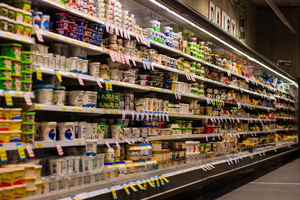Can Consumer Perspectives Impact Sustainability Actions?
Written by: Lara Moody | November 4, 2021
 The short answer to my question is: yes! In “Part 1 – Defining Sustainability” of the Institute for Feed Education and Research’s (IFEEDER) webinar series, Kim Stackhouse-Lawson, Ph.D., director of AgNext at Colorado State University, shared an important idea for agricultural sustainability efforts, which is that sustainability is driven by both science and emotion. The recent Journal of Dairy Science article “Sustainability: Different Perspectives, Inherent Conflict” offers insights on consumer perspectives that further confound sustainability discussions.
The short answer to my question is: yes! In “Part 1 – Defining Sustainability” of the Institute for Feed Education and Research’s (IFEEDER) webinar series, Kim Stackhouse-Lawson, Ph.D., director of AgNext at Colorado State University, shared an important idea for agricultural sustainability efforts, which is that sustainability is driven by both science and emotion. The recent Journal of Dairy Science article “Sustainability: Different Perspectives, Inherent Conflict” offers insights on consumer perspectives that further confound sustainability discussions.
Definitions for sustainability abound, with those attentive to the space generally agree it focuses on social, economic and environmental outcomes. However, the lack of definitional clarity and clear consumer-facing communication has opened the door for alternative consumer perspectives.
The authors note that consumer definitions are also not well defined and are highly influenced by preconceived ideas and biases. For example, consumers may at the same time value both technological advances and the perception of undisturbed natural agricultural systems.
In reviewing perceptions, consumers’ sustainability ideas were clustered into three categories. The largest percentage of consumers related sustainability to reducing waste and environmental harm, but a significant percentage related sustainability to happy cows and conscious farmers, and another group linked sustainability to simple ingredients with minimal processing.
The research also showed that there is overlap between consumer perceptions of sustainability and the terminology they relate it to, such as natural, healthy, trustworthy and ethical. The overlap can affect perception and purchasing intent; for example, a product marketed as “sustainable” may be seen by consumers as healthier, or a product marketed as “natural” may be seen as more sustainable. The average dairy product consumer was also noted to consider plant-based alternatives more sustainable than their dairy counterparts, believing it to have a reduced environmental impact and better for animal welfare.
The authors concluded that if industry efforts misalign with consumers’ expectations for sustainable dairy, consumers may become confused or feel misled; and, misrepresentation of sustainability efforts can easily lead to consumer backlash. Understanding consumers’ definitions of sustainability may be as important as defining sustainability for ourselves. Without alignment, consumers could believe they have been deceived because product messaging does not align with their own perceptions.
Emotion does bias and shape consumer perceptions. While the article focuses on the dairy industry, I would suggest that it is equally applicable to the other protein sectors. In many cases, the animal feed industry does not market directly to consumers, but it doesn’t take much to envision a package of hamburgers, which indicate that the beef cows were fed sustainably sourced feed. What perception would a consumer read into that and what would it mean for our businesses?